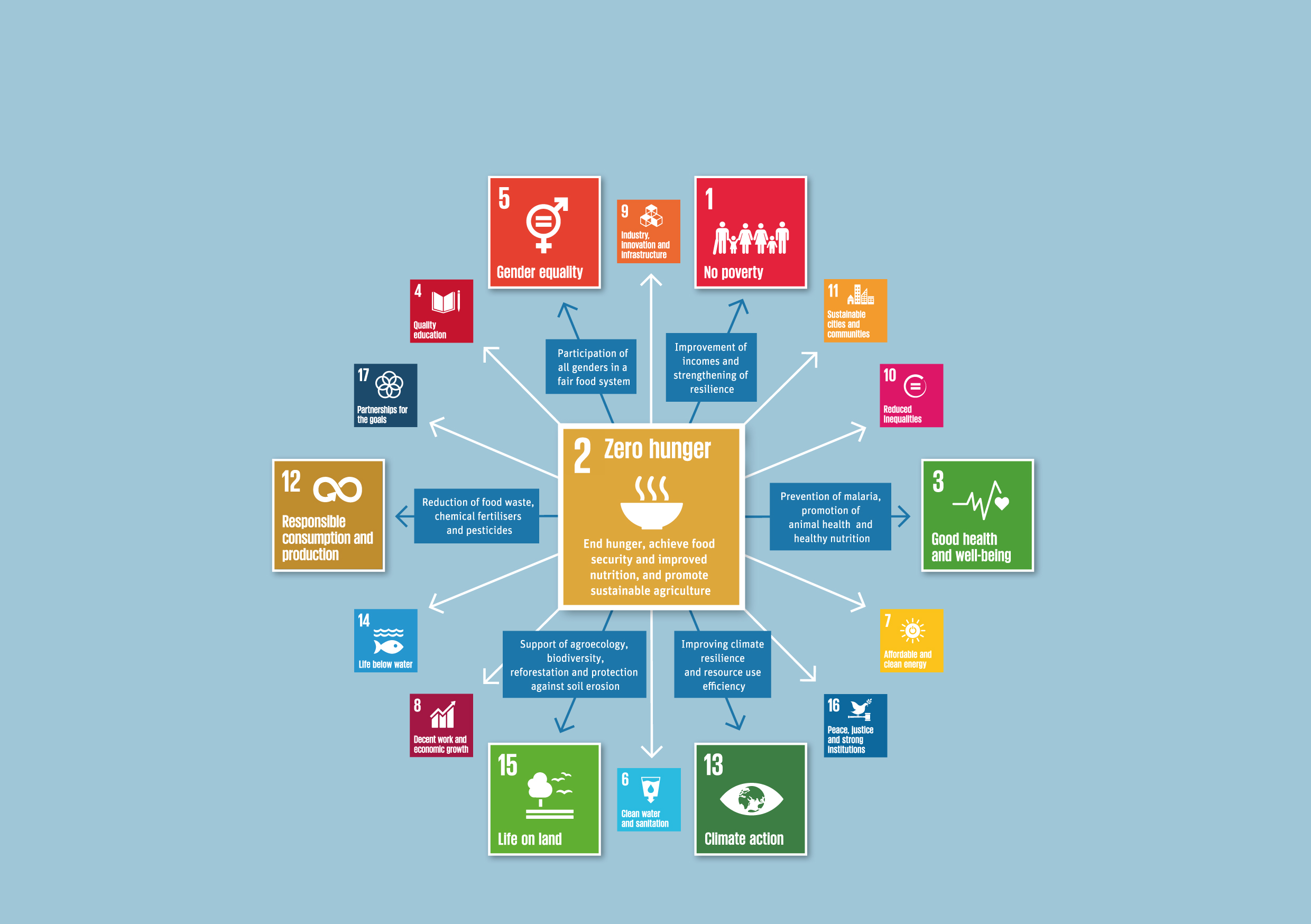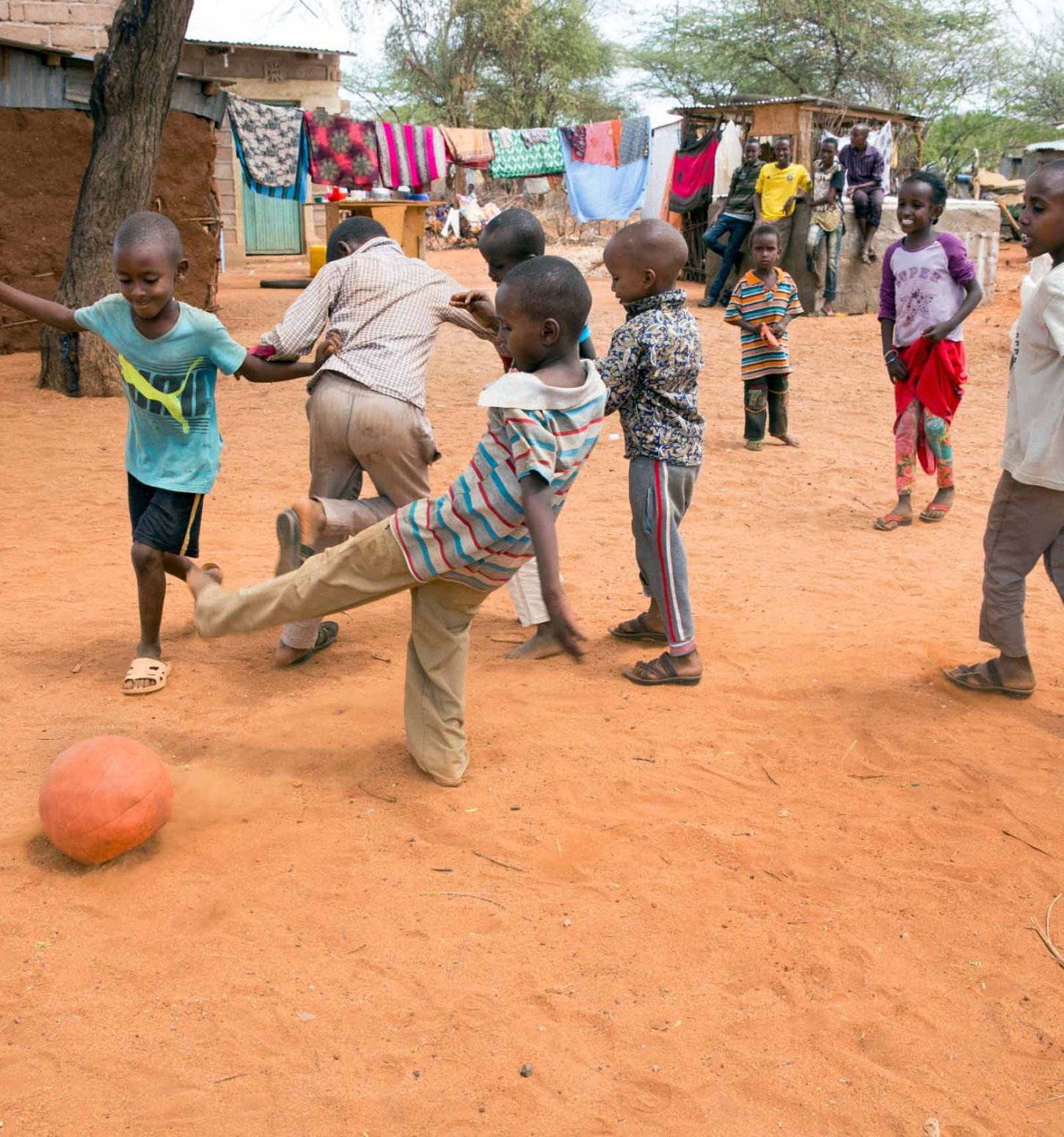Our goals and values
A world with enough healthy food for everyone, produced by healthy people in a healthy environment: this has been our commitment at Biovision for more than 25 years in Africa, in Switzerland and internationally.

About our work
Through concrete applications in agriculture, science and politics, we prove that people can be fed well and healthily without endangering natural resources. We show how the food system – from production to consumption – can be made sustainable. In doing so, we develop, test and disseminate solutions to overcome hunger, poverty, consequences of climate change and biodiversity loss. Approximately 50 employees in Zurich and Geneva, supported by colleagues from 23 partner organizations in sub-Saharan Africa, make up Biovision.
Where we work
In Switzerland we provide useful tips and information about sustainable consumption, and we are active in the movement for a sustainable food system.
In sub-Saharan Africa we disseminate knowledge and practical skills in organic agriculture to farmers, extension workers and authorities.
Internationally we build new alliances with governments, organizations and business to achieve better ecological and social framework conditions.
How we work
Our core competence lies in imparting knowledge about organic agriculture and responsible consumption, plus in strengthening the capacity for action. We build networks and form strong alliances to realize our vision. We inspire and motivate people to reconsider their ways and act sustainably. Our approaches are based on science and tested practically. We maintain close cooperation with competent, locally entrenched partner organizations. We lead by example and act diligently and transparently.
Our goals
The ultimate goal of our commitment is to achieve sustainable impact. To work towards the vision of no hunger and a transformation to a sustainable food system, we direct our energy to where it generates the greatest and longest-lasting impact in relation to our efforts:
Thanks to greater resilience, people can better withstand crises – caused by climate change, for example – and recover more quickly. We strengthen this resilience through ecological and innovative approaches, which improve food security by creating more and healthier food, plus more regular access to it, and by increasing family incomes.
The more local actors from civil society, research, small and medium-sized enterprises, and politics that have relevant, science-based knowledge for transforming food systems sustainably, the more effective their engagement and the greater the number and power of forces set in motion for integrated sustainable development.
Supportive and enabling environments for food system actors are central to sustainable transformation and the spread of agroecology. We work with policymakers, researchers and institutional funders to identify ways to create enabling environments through coherent policies, better funding and supportive institutional frameworks.
How our food is grown, processed and consumed has a massive impact on our ecological footprint in Switzerland and abroad. We raise awareness and motivate the public and institutions to actively engage in the implementation of the United Nations 2030 Agenda for Sustainable Development and an agroecological transformation.
Our impact
We follow a systemic approach and work to bridge a variety of stakeholders. In doing so, we rely on:
Support of agroecological innovation and its dissemination in cooperation with local research institutions and the private sector.
Knowledge transfer and empowerment of local communities and organizations.
Policy dialogue to connect different actors and change framework conditions.

Diligence and transparency
Our everyday commitment to ecological development is shaped by principles of solidarity and justice, now and for future generations. Financially and beyond, we act and report authentically and transparently. In doing so, we are guided by the following values:
- We empower people to solve their own problems and act autonomously.
- We focus on holistic and practical solutions that contribute to environmental and human health.
- We bridge agriculture, politics, science, civil society, private, philanthropy and development cooperation sectors.
- Our actions are oriented towards impact, and we communicate honestly and authentically.
- We work in a participatory way and eye-to-eye with our partners, patrons and beneficiaries.
Diligence with your donations
Biovision Foundation is politically and economically independent. It is subject to the Swiss Federal supervisory authority for foundations (Eidgenössische Stiftungsaufsicht) and bears the Zewo seal of approval. It uses its funds carefully and purposefully. The accounts, reviewed by an external auditor, are prepared in accordance with the Swiss GAAP FER 21 accounting recommendations, the statutory provisions and the Zewo Foundation guidelines, and the provisions of the foundation’s statutes.
Biovision is committed to the ethical guidelines of Swissfundraising. Honesty, respect, integrity, professionalism and transparency are paramount. Donations to Biovision can be deducted from taxes in Switzerland. In the United States, Biovision is considered a public charity under Section 501(c)(3).
For more information about Zewo’s certification and its 21 standards, click on the following link.
- The 21 Zewo Standards
- Ethical guidelines of Swissfundraising (only available in German and French)
Responsible communication
Biovision is committed to respecting people’s dignity in communication and fundraising and to upholding their personal integrity. This also includes the claim to portray an authentic and truthful image of the global South. We are guided by Alliance Sud’s internal guidelines for responsible communication in the international cooperation sector, meaning a voluntary commitment to the public.
Ecological footprint
Biovision is an internationally active organization. Business travel is therefore often unavoidable, whether for meetings with project partners in East Africa or for participation in international conferences. In our operational activities, we take care to minimize our environmental footprint and ensure that unavoidable travel for our international work is efficient and as effective as possible. Our climate footprint in 2022 was 73 tons of CO2 equivalents. We offset this via myclimate by contributing to the project “Small-scale farmers reforesting in Uganda”. We purchase certified green electricity for our offices in Zurich and Geneva. The production of our mailings and their distribution by Swiss Post are climate neutral.

